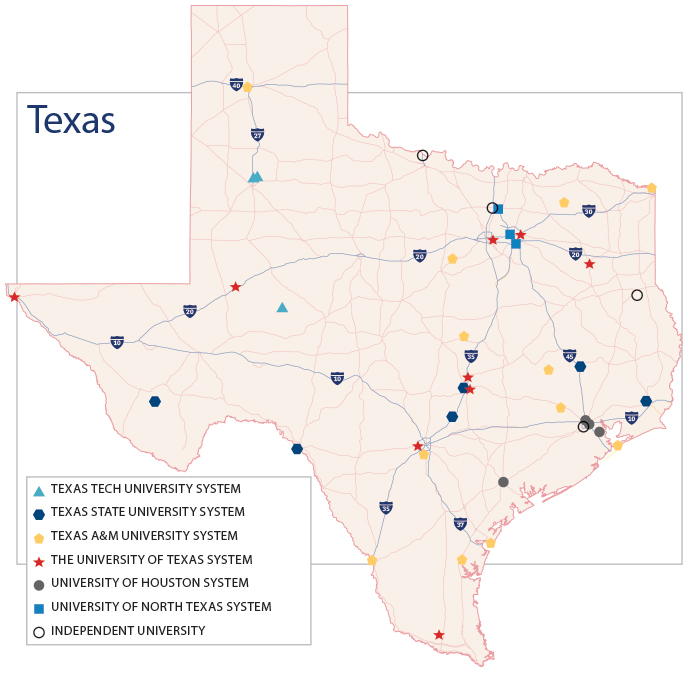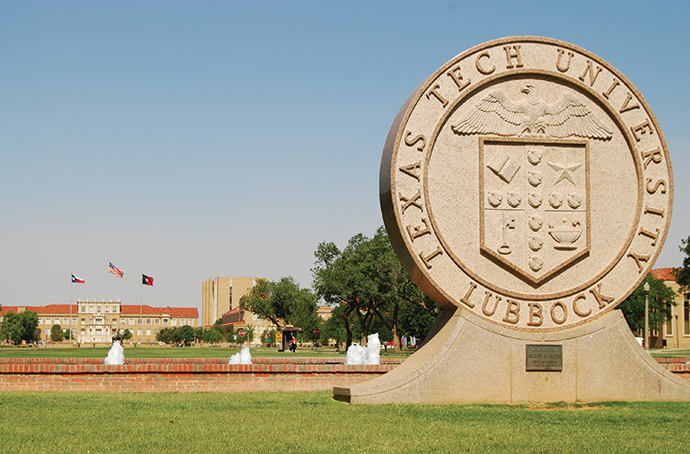The second-largest workforce in America is over 14 million strong and is growing by the minute.
Texas’s robust system of 148 higher education institutions includes six public state university systems, six state technological college systems, and 50 community college districts. Across the state, these institutions educate 1.57 million students annually.
Even with the challenges of remote instruction following the pandemic, Texas state university systems saw increased enrollment. We’ve compiled key information regarding each of the state’s six public university systems. With so many leading educational and research locations across the Lone Star State, a skilled and talented workforce is around every bend.
-
Texas A&M University System: One of the largest systems of higher education in the country, the Texas A&M University System is a statewide network of 11 universities, with its flagship campus in College Station. According to Money Magazine, Texas A&M University ranks No. 1 in the state for value. The university’s student population ranks among national leaders and is the largest in Texas, according to U.S. News and World Report.
 Texas A&M LBJ Student Center.Photo courtesy of Texas A&M University
Texas A&M LBJ Student Center.Photo courtesy of Texas A&M UniversityIn 2020, the system began building a half-billion-dollar complex in the Texas Medical Center area in Houston. The complex will house the university’s groundbreaking Engineering Medicine (EnMed) program and create additional student housing and medical office space.
According to Forbes, Texas A&M University is the No.1 university in the nation for having the most graduates serve as CEOs of Fortune 500 companies. The university system also boasts an impressive lineup of nationally-ranked programs for business, engineering, health care, petroleum engineering, biology & agricultural engineering, nuclear engineering, and veterinary medicine.
-
Texas State University System: The first higher education system established in Texas today has evolved into a network of seven institutions and 13 campuses stretching from the Texas-Louisiana border to the Big Bend region in West Texas. Member institutions include Lamar University, Sam Houston State University, Sul Ross State University, Texas State University, Lamar Institute of Technology, Lamar State College Orange, and Lamar State College Port Arthur. Lamar Institute of Technology was recently named No. 7 among the top 50 community colleges by Academic Influence — out of nearly 1000 community colleges in the U.S.
The Texas State University System (TSUS) is the third-largest system in Texas, with enrollment exceeding 87,000 students in the Fall 2020 semester. The system also maintains the lowest average tuition and fees of any university system in Texas.
Texas State University (TSU) in Round Rock enrolls some 38,000 undergraduate and graduate students in its more than 200 degree programs. In 2020, TSU established the Center for Innovation and Entrepreneurship to foster collaboration and innovation across disciplines.
-
Texas Tech University System: One of the top public university systems in the nation, the Texas Tech University (TTU) System consists of four component institutions — Texas Tech University, Texas Tech University Health Sciences Center, Angelo State University and Texas Tech University Health Sciences Center El Paso — and operates in 18 cities (16 in Texas, two international).
TTU has seen a decade of significant growth and recently hit a major enrollment milestone reaching a student population of more than 40,000. The university will be welcoming its inaugural class in fall 2021 to its new School of Veterinary Medicine.
According to Corporate Recruiter College Graduate Ranking Poll, a national survey of corporate business recruiters by Witman Insight Strategies, TTU graduates are among the most sought after in the country. Additionally, TTU has recently earned a designation as a Hispanic-Serving Institution (HSI) by the U.S. Department of Education.
-
The University of Houston System: Ranked among the best in the U.S., the University of Houston (UH) is home to innovative research and a diverse student population. UH earned a top 50 ranking on U.S. News and World Report as a “Top Performer for Social Mobility” and also landed on the lists for “Top Public Schools” and “Best Value Schools.”
UH enrolled more than 47,000 undergraduate and graduate students in fall 2021. In recent years the university’s C.T. Bauer College of Business and Wolff Center for Entrepreneurship were named the No. 1 program in the U.S. for developing undergraduates to become entrepreneurs by The Princeton Review.
The University system consists of four separate universities, including the University of Houston Clear Lake, University of Houston Downtown, University of Houston-Victoria, and the University of Houston.
-
University of North Texas System: Based exclusively in the Dallas-Fort Worth region, the University of North Texas System includes the University of North Texas, University of North Texas Health Science Center and the University of North Texas at Dallas. A regional educational leader — with campuses in Dallas, Denton, Fort Worth, and Frisco — UNT offers more than 300 bachelor’s, master’s, and doctoral degree programs.
 University of North Texas eagle statue soars above students.Photo courtesy of UNT
University of North Texas eagle statue soars above students.Photo courtesy of UNTUNT’s flagship university in Denton is a Tier 1 research university with more than 40,000 students. The UNT Health Science Center in Fort Worth is one of the nation’s premier graduate academic medical centers and is a top producer of primary care physicians in the state. It’s also a leader in DNA and Alzheimer’s Disease research.
-
University of Texas System: Enrolling more than 1/3 of the students in Texas public, academic institutions, the University of Texas (UT) System has 14 academic and health institutions in multiple locations across the state, producing more than 64,000 degrees annually. UT is one of the most innovative universities in the world, collectively ranking No. 3 for most U.S. patents granted in 2019. Additionally, the UT System is No. 1 in Texas and No. 2 in the nation in federal research expenditures.
According to U.S. News & World Report, several UT programs ranked among the 2021 best online college programs in the country. The ranking focused on degree programs designed to be administered online (rather than programs brought online in response to the pandemic) and highlighted programs of study at UT Arlington, UT Dallas, UT Medical Branch and UT Tyler.


